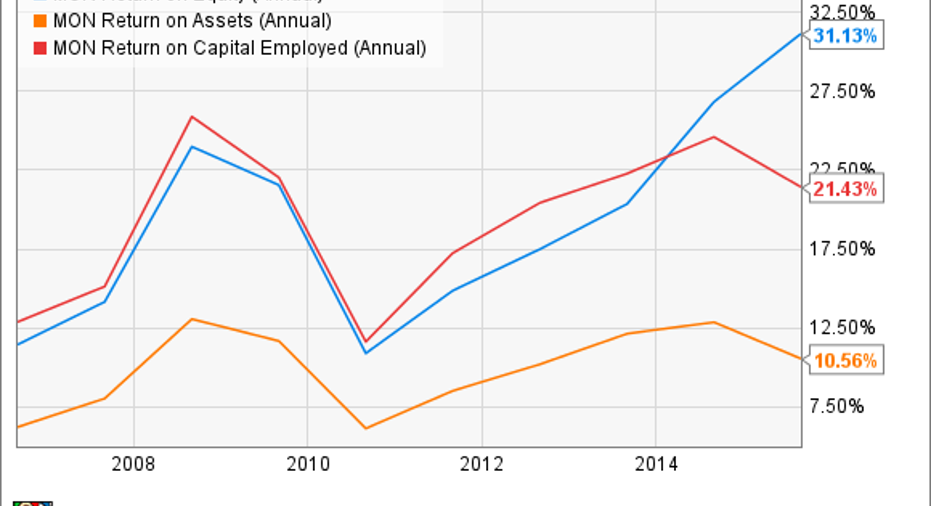3 Best Agriculture Stocks to Buy

As farming is a vital industry, agricultural stocks offer great potential. Image source: Getty Images.
Agricultural and farming stocks are far from sexy, but investing in ag stocks can prove very valuable -- it means investing in businesses that provide daily essentials like food. From farm-equipment manufacturers to agricultural chemicals, fertilizers, and seed companies, ag stocks include popular names like:
| Company | Agricultural Industry |
| Potash Corp. of Saskatchewan (NYSE: POT) | Fertilizers |
| Moasic Company (NYSE: MOS) | Fertilizers |
| Deere & Company (NYSE: DE) | Farm Equipment |
| Monsanto Company (NYSE: MON) | Seeds, agricultural chemicals |
| CF Industries Holdings (NYSE: CF) | Fertilizers |
| Agrium (NYSE: AGU) | Fertilizers, seeds, agricultural chemicals |
| AGCO Corp. (NYSE: AGCO) | Farm equipment |
| CNH Industrial (NYSE: CNHI) | Farm equipment |
| Syngenta (NYSE: SYT) | Seeds, agricultural chemicals |
But which of these agricultural stocks is the best buy right now? Here are three to consider.
Agrium Inc.: A diversified agricultural stock
Better known as a fertilizer company, Agrium is perhaps one of the most diversified agricultural stocks. While the company derives a major chunk of sales from its retail business of seeds and crop-protection products, fertilizers make up a greater portion of its profits. On the one hand, that has proved a disadvantage in recent times, with the fertilizer market in a slump. On the other, diversity has helped Agrium weather the storm better than pure-fertilizer plays like PotashCorp, Mosaic, and CF Industries. Check for yourself how dramatically Agrium's net income has grown in the past decade compared to peers, especially PotashCorp:
AGU Net Income (TTM) data by YCharts.
Agrium was pretty stingy about returning profits to shareholders until about three years ago, when a proxy battle with activist investor forced the company to rethink its capital allocation policies. Agrium's dividend has more than quadrupled, and share repurchases have exceeded $1 billion since 2012. What's more, Agrium's free cash flow per share has almost doubled since 2013 -- no mean feat in an industry that's subject to the vagaries of unpredictable macro factors like climate and commodity prices.
With capital expenditures expected to taper in coming years, Agrium's cash flows and shareholder returns should only grow higher. Aggressive moves to expand its retail distribution network, even as it curtails costs in its fertilizer business, should position Agrium for solid growth when the business cycles turn.
Deere & Company: Warren Buffett's favorite agricultural-equipment stock
With a legacy that spans 175 years, Deere's name is almost synonymous with farm equipment -- an industry that's integral to farming, as it wouldn't be possible to prepare land, grow crops or apply fertilizers evenly without machinery like tractors, plows, combines, and sprayers.
An unbeatable brand name, innovative leadership, strong distribution network, solid global footprint, and a finance arm that provides loans to customers (facilitating big-ticket purchases) all give Deere a solid edge over peers like AGCO and CNH Industrial. Its competitive advantage is reflected in its numbers: Even in an exceptionally challenging year like 2015, Deere delivered an astounding return on equity of 24%. AGCO and CNH aren't even close with their single-digit percentage ROE.
Deere is also a more diversified company than its peers, generating almost a quarter of its revenue from its construction-equipment and forestry businesses. You'd also be surprised to know that Deere is the largest producer of four-wheeled self-driving vehicles in the U.S. -- a stamp of the company's innovative leadership.
It's no surprise, then, that Deere plowed its way into Warren Buffett's portfolio. Investors in Deere have made a killing too, as the company tripled its dividend in the past decade and has repurchased shares worth $16.4 billion since 2004. Investors whobuy the ag stock todaymay reap similar returns in the years to come.
Monsanto Company: A controversial but promising ag stock
As controversial as Monsanto's genetically modified products might be, there's no denying that the company has withstood the tests of time and delivered investors great returns:
MON Return on Equity (Annual) data by YCharts.
Monsanto's double-digit-percentage returns, despite the cyclicality of the ag industry and the frequent GMO backlashes, are not a fluke. Monsanto not only develops seed traits, but also licenses them to others, including its rivals. Now how many times have you heard of a company's rivals using its products? Backed by its dominance in the industry, a strong research-and-development pipeline, robust investments in the Internet of Things for agriculture, and increased global penetration of its key corn and soybean traits, Monsanto expects to grow its earnings per share by mid-teen percentages between 2017 and 2021.
Monsanto is now an interesting potential takeover target, following Bayer's recent buyout bid. While Monsanto rejected Bayer's proposal, the two companies are reportedly in talks about potential transactions. Their merger would create the world's largest agricultural chemicals company. And if that doesn't happen, Monsanto will likely pursue other growth opportunities, similar to its recent attempt to acquire Syngenta. Either way, Monsanto offers great growth potential, and shareholders who add the ag stock to their long-term portfolios can expect good value for money.
A secret billion-dollar stock opportunity The world's biggest tech company forgot to show you something, but a few Wall Street analysts and the Fool didn't miss a beat: There's a small company that's powering their brand-new gadgets and the coming revolution in technology. And we think its stock price has nearly unlimited room to run for early in-the-know investors! To be one of them, just click here.
Neha Chamaria has no position in any stocks mentioned. The Motley Fool is short John Deere. Try any of our Foolish newsletter services free for 30 days. We Fools may not all hold the same opinions, but we all believe that considering a diverse range of insights makes us better investors. The Motley Fool has a disclosure policy.



















